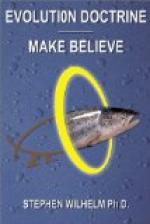In human social evolution the starting point is not so simple as the solitary unit from which insect societies evolved,—that is, an organism which lives alone and is associated with another of its species only at the time of mating. The lowest human beings now existing have some form of family organization, traceable to the more or less continuous unions formed among certain of the apes and even among many lower animals, and not a characteristic that belongs to mankind alone. The savage and his mate constitute the social unit out of which all else is built up; the man and the woman must perform all of the vital tasks demanded by nature. Fruits and vegetables must be secured from the wild forest or by cultivation; the flesh of game animals or of a human victim is no less essential for food. The savage is his own weapon maker and warrior; he himself builds the rude shelter for his family and fashions the canoe if such is required. He is also his own judge, recognizing no control save the dictates of his wishes and needs, for he does not consciously realize that he must obey the primal commands of nature to preserve himself and his family so that the species shall persist. In brief, the elementary family unit carries on all of the individual biological tasks of foraging, righting, home-building, and the like, and it also discharges the racial task of multiplying, quite as instinctively as it provides for its own maintenance.
By the union of several families, a primitive association arises, like that of the Veddahs in Ceylon. The primal duties of each family are unchanged, and their biological activities are identical, as in the protozooen colony of Vorticella or in a pack of wolves; but certain new relations are established. A member of such an inchoate tribe must not treat his confreres as he might a man of another group; robbery and murder within the limits of the small association are detrimental to communal interests, though they may remain unchecked if the victims are strangers. Cooeperation for mutual offense and defense makes the group stronger than its constituent family units taken singly, and every man of such a tribe gains something by looking out for others as well as for himself. By natural selection alone the bonds of union would be strengthened in direct proportion to the subordination of individual interest to group welfare, and to the amount of altruistic action that in a true sense grows out of purely selfish conduct.




